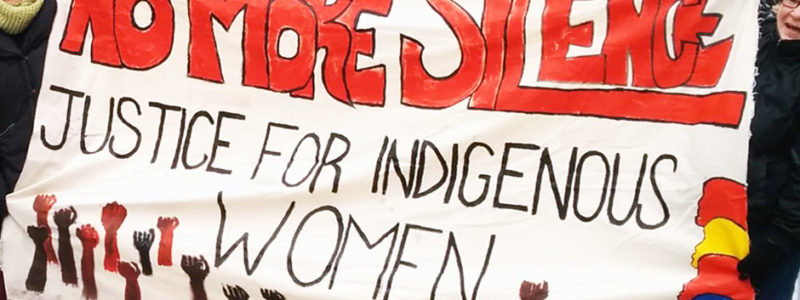Central Executive Committee, June 2019
The YCL-LJC recognizes the work done by the National Inquiry Commission on Missing and Murdered Indigenous Women and Girls despite various constraints and a time limit too short to shed full light on such a dramatic and complex situation. We also recognize the courage of the more than 2,000 Indigenous women who testified before the commission despite the hostile climate in which these women are still plunged (since the beginning of this investigation, more than 130 Indigenous women have been murdered).
This long-awaited report not only looks at the issue of missing and murdered Indigenous women and girls as isolated incidents, but rather, throughout the 1,200 pages it attacks, addresses the systemic causes of violence against Indigenous women. Thus, members of the Commission did not hesitate to make the genocide perpetrated against nations and Indigenous peoples a central theme of the report, as well as the perpetuation of colonial structures and policies by the Canadian state.
Shamefully, Justin Trudeau and his government, although they hailed the report at first, initially refused to pronounce the term “genocide”. This omission is in keeping with the political cynicism of this government towards Indigenous peoples and nations.
Indeed, even though he was elected through his promise to restore nation-to-nation egalitarian relations with Indigenous peoples, the Liberal government was quick to betray that promise. From the earliest days, it has been clear that the claims of Indigenous peoples weigh little against the weight of the big oil companies. Thus, laughing at the rights of Indigenous peoples, the Trudeau government gave carte blanche – and even assistance – to companies such as Kinder Morgan to build their pipelines despite the opposition of these peoples and nations.
In the same order of ideas, partisan politics a few months before the federal election counted more for the current government than the quality of the inquiry which, according to the commissioners, should have been extended by 2 years. In addition, the tight budget and access to information quickly impacted the work of the commissioners, of which more than ten have slammed the door.
It is therefore not surprising that Trudeau only used the word genocide from intense public pressure. Contrary to what many have pointed out in its wake, it is not a semantic debate, but refusing to say genocide is total denial of the responsibility of successive governments that, since 1867, have adopted genocidal policies towards peoples and Indigenous nations to secure the profits of big business.
Shamefully, many Canadian corporate media pundits and politicians deny that this genocide is still going on today, but more fundamentally, also deny that Canada is based, among other things, on the theft of Indigenous territories and that, as a result, the Canadian Constitution of today bears the vestiges of British colonialism.
As Young Communists we have not harbored any illusions about the sincerity of the Trudeau government with respect to Indigenous peoples and nations. We know all too well that the interests he represents are served when Canada continues to exist as a prisonhouse for nations. We also know that the thousands of missing and murdered Indigenous women are not isolated cases, but the very product of Canadian imperialism.
Nevertheless, we recognize the merit of this report – written thanks to years of popular pressure – which not only reveals the systemic causes of this racist and gendered violence, but which, through its 231 recommendations, is intended as a tool for action. We therefore commit ourselves to ensuring that these recommendations are put in place as quickly as possible while continuing to mobilize us to ensure that Indigenous peoples can avail themselves of their right to self-determination up to and including separation; the only guarantee of a genuine equal and voluntary partnership between the different nations that make up Canada.

